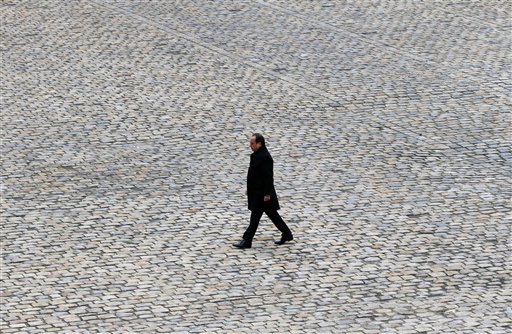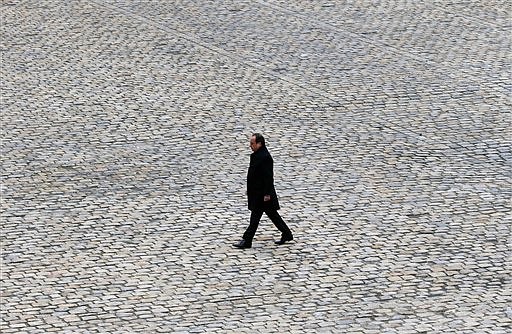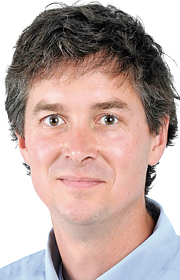Is this what the '60s felt like?
Never before in my lifetime, or the lives of other 40-somethings, has America seemed so unstable and unnerved. We're a temperamental, volatile goulash of a country, with all corners of society - politics, religion, environment, economy, law and order - in some sort of flux.
2015? It was the Year of Fear. Give us some Geiger-instrument to measure it, and we would find fear at elevated levels. There seems so much anxiety in the air, a sort of Chicken Little subtext in much of what we do, say and think.
 French President Francois Hollande walks in the courtyard of the Invalides national monument during a ceremony in Paris, Friday, Nov. 27, 2015. Intoning the names of 130 dead, a subdued France paid homage Friday to those killed two weeks ago in the attacks that gripped Paris in fear and mourning. (AP Photo/Francois Mori)
French President Francois Hollande walks in the courtyard of the Invalides national monument during a ceremony in Paris, Friday, Nov. 27, 2015. Intoning the names of 130 dead, a subdued France paid homage Friday to those killed two weeks ago in the attacks that gripped Paris in fear and mourning. (AP Photo/Francois Mori)View other columns by David Cook
Don't you feel it, too?
The years to come promise even more uncertainty. A changing climate. New racial and religious demographics. An aging boomer population. Increased, disruptive technology. Guns, mass shootings and jihadism. I fear our fears may grow even worse.
However.
In such times of fear, we are given a golden opportunity.
We can learn fearlessness.
"The next time you encounter fear, consider yourself lucky," says the Buddhist monk Pema Chodron. "This is where the courage comes in."
Courage means not running away, but staring fear in its face. We can intimately study and examine our experience of being afraid - the way our stomach tightens and mind races, the way our heart hardens and spirit recoils.
Fear is an emotional reaction to what we perceive as a negative situation. The boss walking toward us, scowling. An oncoming car, veering across the double yellow. The terrorist on the TV news. A lump in a breast. A ringing phone at midnight.
These moments have two things in common.
We can't control them.
And we don't like what is happening.
So our body tenses. Our heart rate jacks up. Sensations are heightened, like a midnight watchman. Tense, panicky, we feel alert, but in a raw, unfriendly kind of way. We feel thin, not whole.
I speak from experience: I carry my own share of anxiety, and feel it most in my stomach, like a belt. Most days, 99 fears out of 100 turn out unrealized, yet each morning, I wake again, part of me afraid all over again.
Adding to our worries is the 24-hour news cycle; the media tap-dances on our anxiety, contributing each day - each moment! - headlines about Things to Worry About in America.
So we use food, drink, sex, pills, TV, phones, anything and everything to pleasure away all our fears. Who can blame us? In such times, who doesn't want to feel in control?
But instead of running from our fear, what if we moved toward it?
That's fearlessness.
Fearlessness is not the absence of fear, but rather an understanding of it. Fearlessness stays seated at the table, not looking for a back-door way out of the discomfort and anxiety. We transform our fears by going through them, not away.
Fear begins with our thinking. If we can develop enough attention to watch how we react to the things in our life - what our spouse says, or the TV, or that email - then we can watch the ways we get caught. Hooked, as the Buddhists call it.
Fear hooks and nets us; fearlessness is the jailhouse spoon that digs us out of our cell. Fear is rigid; fearlessness, fluid. Instead of being carried down the river of anxiety, we notice how fear operates in our lives. We see the fear-thoughts before they overwhelm us. We recognize the teasing, often-false nature of fear. (We're afraid of crime, yet crime rates are incredibly low.) We become less afraid of being afraid.
Fearlessness allows us to stop judging. Some of the richest blessings in life originally appear as curses and villains. As fear rushes to judge and label - Danger! This is bad! Beware! - fearlessness stays humble and patient. What is happening may seem harmful, but the jury is still out. This is not the whole story. We'll see, we say.
All this happens in very plain ways. We learn to sit still, even in our discomfort. We notice what hooks us: a time of day, a certain channel, a certain word or person. We practice restraint; not acting on fear, just watching it.
Like some bronco buster, we can ride out our fear longer. It doesn't toss us. We smile a tad more, breathe slightly deeper. Our peace arrives, not like some superman, but in quiet and deep ways.
Yes, there is much to be afraid of.
But not as much as we think.
Contact David Cook at dcook@timesfreepress.com or 423-757-6329. Follow him on Facebook at DavidCookTFP.

